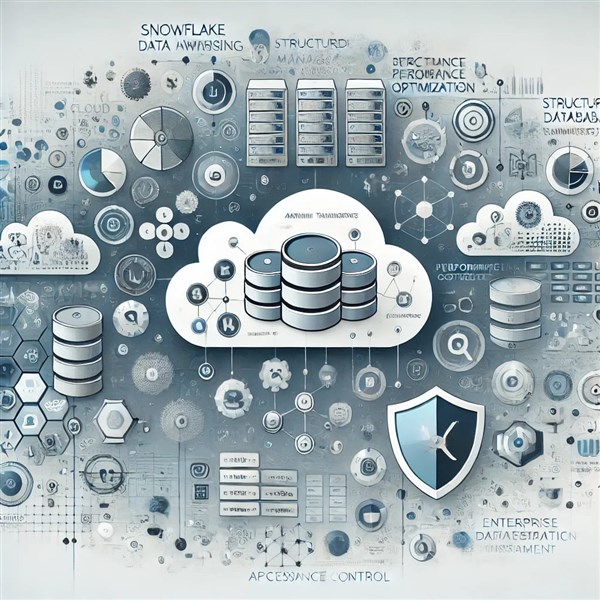Unable to find what you're searching for?
We're here to help you find it
As cloud computing continues to dominate the data industry, companies are shifting from traditional on-premise databases to cloud-based solutions. Snowflake has emerged as one of the most powerful cloud data platforms, offering a scalable, secure, and flexible solution for data storage, processing, and analytics.
However, managing a Snowflake environment requires specialized administrative skills to ensure optimal performance, cost-efficiency, and security. This is where Snowflake Admin Training comes in.
But what exactly will you learn in a Snowflake Admin Training Course? 🤔
In this guide, we’ll cover:
✅ Why Snowflake Administration is Important
✅ Top Skills You’ll Learn in Snowflake Admin Training
✅ How These Skills Enhance Cloud Database Management
✅ Career Benefits of Becoming a Snowflake Administrator
By the end, you’ll have a clear understanding of how Snowflake Admin Training can advance your career and help organizations leverage cloud data more effectively. 🚀
Snowflake is a fully managed cloud data platform, but it still requires skilled administrators to handle:
✔ User and access management
✔ Performance tuning and query optimization
✔ Data security and governance
✔ Cost control and resource management
Unlike traditional databases, Snowflake operates in a multi-cloud environment (AWS, Azure, Google Cloud), requiring cloud-native administration skills to ensure efficient and secure data management.
✔ Ensures optimal performance – Prevents slow queries and storage inefficiencies.
✔ Improves security – Protects sensitive data from unauthorized access.
✔ Manages costs – Optimizes resource consumption to avoid overspending.
✔ Supports compliance – Helps organizations meet GDPR, HIPAA, and SOC 2 regulations.
Now, let’s explore the key skills you’ll gain from a Snowflake Admin Training Course.
✔ Learn how to create, configure, and manage Snowflake accounts.
✔ Set up user authentication and integrate with SSO (Single Sign-On) providers.
✔ Implement Role-Based Access Control (RBAC) to restrict unauthorized access.
🔹 Why this is important:
Proper user and role management ensures that sensitive data is protected and that only authorized users can perform specific actions.
✔ Learn how to configure user roles, privileges, and permissions.
✔ Implement object-level and row-level security to limit data access.
✔ Secure Snowflake environments with Multi-Factor Authentication (MFA).
🔹 Why this is important:
RBAC helps reduce insider threats and ensures that users only access the data they need.
✔ Learn how to monitor query performance and identify bottlenecks.
✔ Use Query Profile and EXPLAIN PLAN to optimize execution.
✔ Implement automatic clustering and materialized views to improve query speed.
🔹 Why this is important:
Performance tuning ensures faster query execution, reducing latency and compute costs.
✔ Configure virtual warehouses for optimized compute performance.
✔ Scale up or down based on workload demands.
✔ Implement Auto Suspend & Auto Resume to optimize cost efficiency.
🔹 Why this is important:
Virtual warehouses allow efficient resource allocation, preventing unnecessary compute expenses.
✔ Learn how Snowflake stores and compresses data for cost efficiency.
✔ Manage time travel and fail-safe retention policies to avoid unnecessary storage costs.
✔ Monitor compute credits to control expenses and prevent overuse.
🔹 Why this is important:
Proper storage management reduces data redundancy and prevents organizations from overspending on storage and compute resources.
✔ Set up Secure Data Sharing between Snowflake accounts and external partners.
✔ Configure database replication for cross-region and multi-cloud availability.
✔ Implement Failover and Disaster Recovery (DR) solutions.
🔹 Why this is important:
Data sharing ensures seamless collaboration across teams, while replication helps in disaster recovery and high availability.
✔ Learn how to integrate Snowflake with AWS S3, Azure Blob Storage, and Google Cloud Storage.
✔ Use ETL tools (Fivetran, Matillion, dbt) for data pipeline automation.
✔ Configure APIs and Snowflake connectors for seamless data ingestion.
🔹 Why this is important:
Cloud integration allows businesses to consolidate data from multiple sources, making it easier to perform real-time analytics.
✔ Use Snowflake’s INFORMATION_SCHEMA to monitor system activity.
✔ Identify slow-running queries and troubleshoot compute resource bottlenecks.
✔ Set up alerting and logging mechanisms for proactive issue resolution.
🔹 Why this is important:
Real-time monitoring reduces downtime and ensures a smooth user experience for business-critical applications.
💰 Salary Trends for Snowflake Admins (2024 Estimates)
✔ Snowflake Administrator – $100,000 - $150,000 per year
✔ Cloud Data Engineer – $110,000 - $160,000 per year
✔ Snowflake Architect – $120,000 - $180,000 per year
🎯 Why Get Snowflake Certified?
✔ Validates your expertise in cloud database management.
✔ Makes you a top candidate for high-paying DBA and cloud engineering roles.
✔ Helps organizations achieve efficient, secure, and cost-effective data management.
✔ Familiarize yourself with Snowflake’s architecture and features.
✔ Set up a free Snowflake trial account to practice.
📌 Best Courses:
✔ Snowflake Fundamentals – Udemy
✔ Snowflake for Data Professionals – Coursera
✔ Official Snowflake Training & Certification
✔ SnowPro Core Certification – Entry-level certification.
✔ SnowPro Advanced: Administrator Certification – Best for Snowflake Admins.
Conclusion
Snowflake Admin Training equips IT professionals with critical skills such as:
✔ User & access management
✔ Performance tuning & query optimization
✔ Cloud integration & cost control
✔ Data security & governance
As businesses continue to adopt cloud databases, the demand for Snowflake Administrators is growing rapidly.
In conclusion, a Snowflake Admin Training Course from Koenig Solutions can equip you with the necessary skills to navigate the Snowflake platform. Whether you're a beginner or an experienced IT professional, this course can help enhance your skill set, making you a valuable asset in the data management field.
💡 Are you ready to advance your career? Start your Snowflake Admin Training today! 🚀

Aarav Goel has top education industry knowledge with 4 years of experience. Being a passionate blogger also does blogging on the technology niche.










